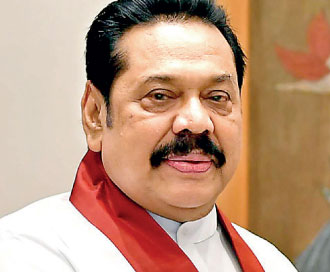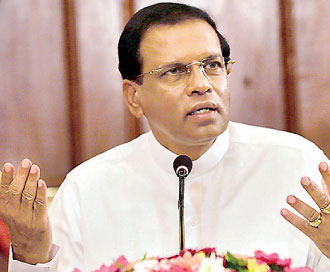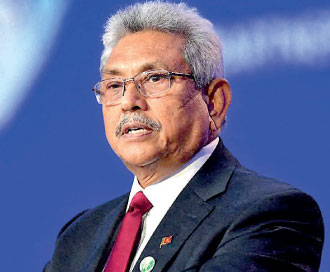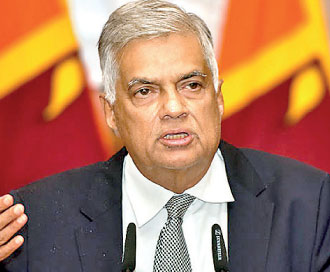Tuesday Feb 17, 2026
Tuesday Feb 17, 2026
Monday, 2 October 2023 02:02 - - {{hitsCtrl.values.hits}}

Mahinda Rajapaksa

Maithripala Sirisena

Gotabaya Rajapaksa

Ranil Wickremesinghe
The first-ever Governance Diagnostic Assessment (GDA) on Sri Lanka compiled by the International Monetary Fund (IMF) has revealed widespread systematic and severe governance weaknesses and corruption vulnerabilities across State functions, with particular macroeconomic impact.
The report stressed the appalling status impacted budget credibility; expenditure control; public investment management and control of spending); public procurement; management and oversight of State-Owned Enterprises (SOEs); transparency of revenue policy and the integrity of revenue administration; the governance and legal frameworks of the Central Bank; the application of financial sector regulations; and clarity and security of land ownership and the integrity of the judicial sector.
“Corruption vulnerabilities are exacerbated by weak accountability institutions, including the Commission to Investigate Allegations of Bribery and Corruption (CIABOC) that have neither the authority nor competency to successfully fulfil their functions,” stated the GDA, which the IMF compiled in response to a request from the Government of Sri Lanka.
It said current governance arrangements have not established clear standards for permissible official behaviour, acted to deter and sanction transgressions, nor pursued individuals and stolen public funds that have exited the country. Regular civil society participation in the oversight and monitoring of Government actions is restricted by limited transparency, the lack of platforms for inclusive and participatory governance, and by broad application of counter-terrorism rules.
“These weaknesses and vulnerabilities highlight several broader governance themes that need to be addressed for planned reforms to be sustained. Problematic structural issues that shape governance dynamics include the compromised independence of key governance institutions, critical gaps in the legal and regulatory infrastructure for managing and overseeing public resources, limited fiscal discipline and transparency, and a disorganised regulatory and legislative process that provides for insufficient review and engagement,” it said.
It was pointed out that minimal progress has been made in integrating modern information technology into public sector operations and public-private interfaces, or in linking information to detect and correct inefficiencies and improprieties. These governance features form the basis for the substitution of informal mechanisms of control for rule-based systems of accountability for performance and integrity over an expansive State.
“The impunity for misbehaviour enjoyed by officials undermines trust in the public sector and compounds concerns over limited access to efficient and rule-based adjudication process for resolving disputes,” the GDA revealed.
The report highlights immediate and short-term measures to address key corruption issues, as well as structural reforms that require more time and resources but are essential to strengthen governance and initiate lasting change. A list of “priority” recommendations is provided below. They primarily focus on measures related to critical risks, including addressing gaps in existing legal frameworks and the public provision of essential information for oversight and monitoring. Priority recommendations are explored in more depth in the subsections of the report, which also contain more extensive recommendations, including structural and institutional measures to achieve more transparent and efficient governance that operates with integrity and in accordance with the rule of law.
The recommendations are designed as a coherent approach to improving governance through a focus on clarity of authority and responsibility for core functions; financial and operational independence of essential accountability and law enforcement institutions; transparency in government practices and performance, especially relating to the planning, spending, and accounting for the use of public funds and assets; inclusive, accessible, and rule-based means to enforce private agreements and challenge official behaviour; and efficient mechanisms for making information public and holding organisations and individuals to account for their performance and behaviour.
The IMF report said the combination of short-term actions to deliver concrete and observable improvements and long-term structural initiatives to change how the public sector functions in Sri Lanka is essential to achieving the social and economic aspirations of the country.
It acknowledged that comprehensively addressing governance weaknesses would require medium – and long-term initiatives, significant resources, and prolonged efforts, including support from Sri Lanka’s international partners.
“The recommendations coming out of this diagnostic will contribute to the formulation of governance and anticorruption policies and programs, improvement of the legal and institutional frameworks, as well as governance and anti-corruption reform measures agreed to in the Staff Level Agreement for an Extended Credit Facility Arrangement for Sri Lanka,” the GDA report stressed.
The report noted that widespread and persistent popular protests in 2022 over the behaviour of top officials reflected a consensus that corruption had paved the way for the economic crisis. The subsequent resignation of President Gotabaya Rajapaksa in July 2022 emphasised that addressing the crisis required changes in governance as much as changes in economic policies. The role of civil society in demanding accountability carried an equally important message about the drivers of change.
The report acknowledged that President Wickremesinghe has announced that his Government is “committed to implementing anti-corruption practices through a Government mechanism that emphasises accountability.”
